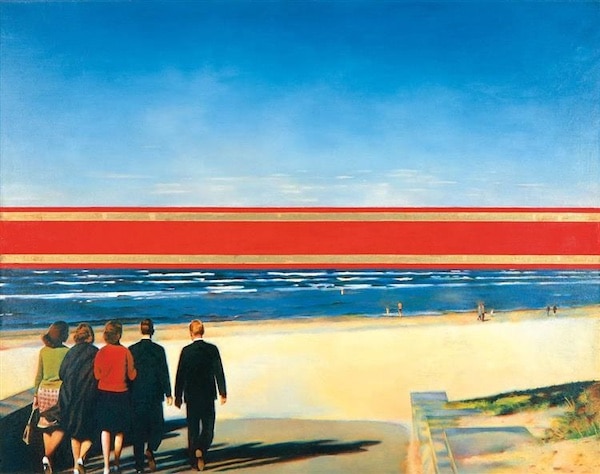Dear friends,
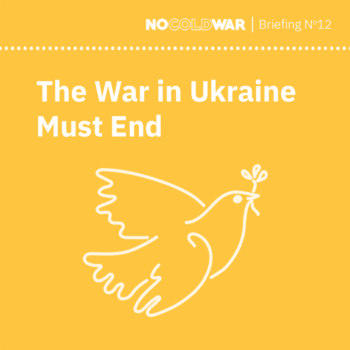 Greetings from the desk of Tricontinental: Institute for Social Research.
Greetings from the desk of Tricontinental: Institute for Social Research.
On 26 January, the North Atlantic Treaty Organisation (NATO) announced the start of a massive military exercise called Steadfast Defender 2024 that will continue until the end of May. Over 90,000 troops from NATO countries (and one partner country, Sweden), including fifty naval groups and more than eighty air platforms, will deploy in thirteen countries to demonstrate the alliance’s capacity and ‘send a robust message about its readiness to protect all Allies in the face of emerging threats’. Of the thirty-one NATO member states, six share borders with Russia (Finland, Estonia, Latvia, Lithuania, Poland, and Norway). This NATO exercise comes just as the European Union announced that it will provide Ukraine with €50 billion in financial support between now and 2027, a reduction compared to the North Atlantic support over the past two years. As public support for the war in Ukraine declines in the Global North states, governments have decided to ramp up tensions along the Russian border through NATO.
Following the announcement of the Steadfast Defender 2024 exercise, NATO Secretary General Jens Stoltenberg travelled to the United States and met U.S. Secretary of Defence Lloyd Austin at the Pentagon. Interestingly, their public comments did not express a shred of concern for the Ukrainian people. Stoltenberg referred instead to the Global North’s anxiety about Russia and China, saying that support for Ukraine is ‘an investment in our own security because the world will become more dangerous if President Putin wins in Ukraine’, warning that the result of this conflict ‘is also closely watched in China’. So, it is not the Ukrainians and their wellbeing that matters but the geostrategic necessity for the Global North to see Russia (and by implication, China) ‘weakened’, as Austin said in Kyiv two years earlier.
To shed light on this conflict, its global implications, and the possibility of peace, the rest of this newsletter is dedicated to No Cold War’s briefing no. 12: The War in Ukraine Must End.
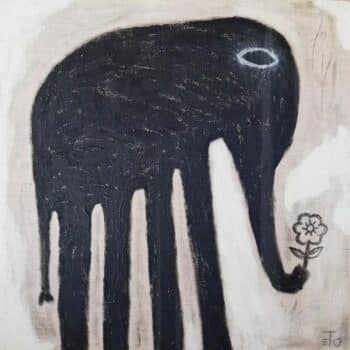
Tuyo (Germany), Elephant, 2021.
Two years ago, on 24 February 2022, Russian forces entered Ukraine. This act was not the start of the war in Ukraine. Rather, it was the acceleration of a conflict that dates back to at least 2014. That year, at the behest of the United States, a new government was imposed on Ukraine, aiming to bring the country closer to the European Union. This initiated the sustained persecution of the country’s Russian-speaking population. The conflict moved swiftly, with Crimea de facto becoming part of Russia once again and the Donbass region of Ukraine becoming a frontline in the conflict between Ukrainian far-right nationalists and Russian speakers. In May 2019, Ukrainian President Volodymyr Zelenskyy took office and pledged to end the battle in the Donbass. Instead, due to pressure from NATO, the conflict intensified, eventually leading to the Russian intervention three years later. It is imperative for the people of Ukraine, Russia, and the world that the war be halted and that the issues be transferred from the battlefield to the negotiating table.
What has been the impact of the war?
In any conflict, casualty figures become a matter of dispute. However, there is little disagreement that over 500,000 Ukrainian and Russian soldiers have died or been injured in this war, that over six million Ukrainians have fled the country, and that over seven million Ukrainians have been internally displaced (out of a pre-war population of nearly 44 million). If the war is not brought to a halt, tens of thousands more will be killed and tens of millions more will suffer.
Ukraine’s economy has been devastated, shrinking by 29% in 2022 alone, according to the World Bank. The impact of the war ricocheted across the globe, causing wheat prices to rise by 21% and some fertilisers to rise by 40% within the first month of the conflict. Global South countries were hit particularly hard by sharp increases in food and energy prices in many regions while the European economy inches towards a recession. In other countries, astronomic amounts of resources have been diverted to the war which instead could have been used for social and economic spending. The U.S. and Europe have already spent well over $200 billion on the war. In December 2023, the head of the Ukrainian armed forces asked U.S. Secretary of Defence Lloyd Austin for a further $350—400 billion to pursue ‘victory’.
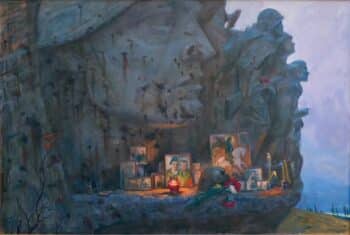
Alexey Kryukov (Russia), Безмолвие. Саур-Могила (‘Silence—Saur-Mogila’), 2017.
In reality, no amount of money will lead to a military triumph. It is clear, particularly after the failure of the Ukrainian ‘counter-offensive’, that there has been no significant change in the military situation, nor is there a credible prospect of one. The continued payment of such huge human and economic costs would be purposeless.
What issues need to be resolved?
1) The position of Ukraine regarding military blocs. At the end of the Cold War, Europe had an opportunity to pursue peaceful economic development. A coherent and balanced economy with enormous potential could have been formed by reducing military spending while combining Western Europe’s high value-added manufacturing and service industries with the former Soviet Union’s energy, raw materials, agriculture, and high-technology industries such as space. In East Asia, which overcame a period of even greater Cold War division and conflict (as seen in the Korean and successive Vietnam and Indochina wars), a focus on mutually beneficial economic development and an avoidance of military and political blocs led it to become the world’s most rapidly growing economic region. This is evidenced by the fact that, since 1990, the GDP of the Association of Southeast Asian Nations has grown by more than 400%. However, in Europe, the U.S. insisted that such policies not be followed and that, instead, the region was to expand the NATO military bloc into Eastern Europe, breaking the commitment it had made at the time of German reunification that NATO would not advance ‘one inch eastward’ towards Russia. The U.S. was fully aware that NATO’s expansion would greatly inflame tensions with Russia and across Europe. Of particular sensitivity was the possibility of Ukraine’s entry into NATO, which would bring the nuclear-armed bloc within immediate striking range of Moscow. Numerous experts on Eastern Europe and Russia strongly and repeatedly advised against such expansion of NATO. Most famously, George Kennan, the original architect of U.S. Cold War policy, predicted in 1997 that, ‘expanding NATO would be the most fateful error of American policy in the entire post-Cold War era’. In December 2021, Russia proposed an agreement that Ukraine would not become a NATO member. In negotiations in March 2022, Ukraine proposed adopting a neutral status in exchange for security guarantees, inspired by NATO’s collective defence clause, which could have involved Poland, Israel, Turkey, and Canada as guarantors. This was blocked by NATO, directly conveyed by way of an urgent visit from British Prime Minister Boris Johnson to Ukraine in May 2022, thereby preventing a rapid end of the war.
2) The position of the Russian-speaking minority in the territory of the Ukrainian state (as it was formed in 1991). A 2001 census found that nearly 30% of Ukraine’s population considered Russian to be their native language. States with large linguistic and ethnic minority populations can only maintain their unity if the rights of such minorities are respected. The policies of the Ukrainian government after 2014, which included suppressing the official use of the Russian language in numerous spheres, were therefore bound to lead to an explosive crisis within the Ukrainian state. As the Council of Europe’s Venice Commission, which certainly cannot be accused of being pro-Russian, stated: ‘the current Law on National Minorities is far from providing adequate guarantees for the protection of minorities… many other provisions which restrict the use of minority languages have already been in force since 16 July 2019’. There are only two ways to resolve this situation: restoration of the full linguistic and other rights of the Russian-speaking minority within the borders of the old Ukrainian state or the secession of these regions from Ukraine. Which outcome is realised will be a key subject of the negotiations. Nonetheless, it is clear that any attempt to maintain the Russian-speaking minority within the Ukrainian state while continuing to deprive them of their rights will not succeed, nor will any attempt by Russia to impose another state on the Ukrainian-speaking population of western and northern Ukraine.
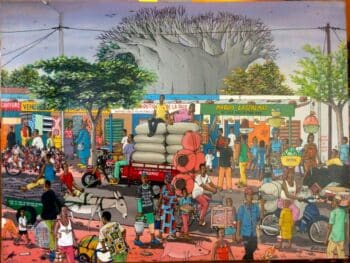
Mahamoudou Zinkone ‘Babs’ (Burkina Faso), Maquis Las Palmas, 2015.
All efforts to resolve these issues by military means will continue to be futile and will only result in further intense suffering, above all for the Ukrainian people. These realities will become increasingly obvious if the war continues—which is why it must be brought to a halt as rapidly as possible and negotiations must commence.
In 1961, the Soviet poet Volodymyr Mikolayovich Sosiura wrote a song on the power of words. Sosiura was born in Debaltseve (which is today in Donetsk) in 1898 within the Tsarist empire and died as a member of the communist party in Kyiv in 1965. He wrote several poems that oscillated between his patriotic love for Ukraine and his commitment to the Soviet Union and to the communist struggle. Above all else, Sosiura—who fought in World War I in Bakhmut and then later joined the Red Army—had a great disdain for war. He recognised the importance of the war against the Nazis, but—like many of his generation—bemoaned the terrible loss of life incurred by this war, such as the 27 million Soviet citizens who died in the fight to defeat the Nazi armies, amongst them 19 million civilians. This was the context of Sosiura’s beautiful poem about words:
I know the power of the word.
It is sharper than a bayonet
and faster than even a bullet,
Faster than an airplane.…
Oh, weapon of happiness: word!
I am used to living beside you.
You are a flower in love,
you are a bayonet in hate.
Warmly,
Vijay

